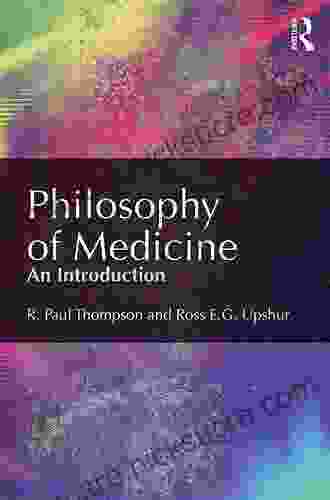: Defining the Philosophy of Medicine
The philosophy of medicine is an interdisciplinary field that examines the fundamental philosophical questions and concepts related to medical practice, healthcare, and human health. It explores the ethical, epistemological, and metaphysical aspects of medicine, providing a framework for understanding the values, assumptions, and beliefs that underpin medical decision-making and healthcare systems.
4.5 out of 5
| Language | : | English |
| File size | : | 532 KB |
| Text-to-Speech | : | Enabled |
| Screen Reader | : | Supported |
| Enhanced typesetting | : | Enabled |
| Word Wise | : | Enabled |
| Print length | : | 288 pages |
| Lending | : | Enabled |
Core Concepts in the Philosophy of Medicine
- Disease and Health: The philosophy of medicine examines different conceptions of disease and health, exploring the criteria for defining each and the relationship between physical and mental well-being.
- Medical Knowledge: This branch investigates the nature and sources of medical knowledge, considering the role of evidence, observation, and scientific inquiry in shaping medical beliefs and practices.
- Medical Decision-Making: The philosophy of medicine analyzes the ethical and epistemological challenges faced by healthcare providers when making medical decisions, exploring concepts of informed consent, patient autonomy, and the role of values and biases.
- Social Justice and Healthcare: This aspect examines the ethical and political issues terkait with healthcare distribution, access, and equity, with a focus on addressing disparities and promoting health equity for all.
Different Perspectives within the Philosophy of Medicine
The philosophy of medicine encompasses a range of perspectives, each emphasizing different aspects of medical practice and healthcare:
Naturalism
This perspective views medicine as a natural science, grounded in the empirical study of human biology and physiology. It emphasizes the role of scientific evidence and objective observation in medical decision-making.
Holism
Holism considers medicine as a holistic discipline, emphasizing the interconnectedness of mind, body, and spirit in health and disease. This perspective advocates for a comprehensive approach to healthcare that addresses the whole person, rather than treating isolated symptoms.
Existentialism
Existentialism explores the subjective and personal aspects of medical practice and healthcare. It focuses on the unique experiences of patients and healthcare providers, their values, and their search for meaning in the face of illness and mortality.
Implications for Medical Practice and Healthcare
The philosophy of medicine has profound implications for medical practice and healthcare systems. It provides a framework for:
- Ethical decision-making: By analyzing ethical concepts and principles, the philosophy of medicine helps healthcare providers navigate complex moral dilemmas and make informed decisions that respect patient autonomy and well-being.
- Patient-centered care: The philosophy of medicine promotes a patient-centered approach to healthcare, emphasizing the importance of understanding patient perspectives, values, and preferences in medical decision-making.
- Healthcare policy: By examining the social and political dimensions of healthcare, the philosophy of medicine informs the development of healthcare policies that promote equity, access, and quality of care for all.
: The Value of Philosophy of Medicine
The philosophy of medicine is an indispensable field that provides critical insights into the fundamental concepts, values, and ethical challenges that shape medical practice and healthcare. It fosters a deeper understanding of the complexities of human health and medical decision-making, contributing to the improvement of patient care, the advancement of healthcare systems, and the promotion of a more just and equitable society.

















































































































































































































































































































































































































































































































































































